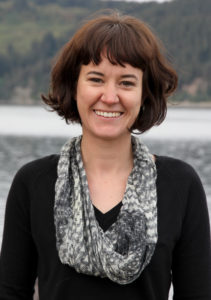
My job at the Council is to foster community engagement. This includes lots of travel to our many small communities, from Cordova in the east to Kodiak Island in the west. I also represent the Council at events such as oil spill prevention and response professional conferences, fisherman conventions, scientific forums, local government meetings or conferences, and community receptions.
All that came to an abrupt halt in March 2020 when the pandemic stopped all travel for the Council. Since then, meetings have been via videoconference, educators have cut most hands-on programs, and conferences have been canceled or switched to online.
To continue citizen oversight of the operation of the Valdez Marine Terminal and tankers that use it, Council staff had to get creative and roll with the rapidly changing field of public engagement.
Our dedicated volunteers adapted quickly to using videoconference technology so the business of the Council could continue without a hitch. Our online public meetings have over sixty participants from our member entities, industry representatives, government agencies, volunteers, and members of the public participating. A long-standing practice of posting all meeting materials on our website, accessible to the public, made the switch to virtual meetings even smoother.
In May, the Council partnered with the Prince William Sound Stewardship Foundation to bring the second annual Prince William Sound Natural History Symposium online for the first time. Only weeks after the pandemic started, the planning committee for the Symposium had to cancel or do something we’d never done: hosting an online summit. Twenty speakers and over 260 participants in the free, one-day event confirmed that going online was worth the effort. The entire series is available online: Prince William Sound Natural History Symposium
The Council gives an annual award at the Alaska Science and Engineering Fair to deserving student projects related to oil spill prevention or response. This year the fair went virtual and Council volunteer Steve Lewis judged the projects remotely. The Council was proud to award Kate Deering the award for her project, Designing an Oil Filtration Device for Removing Oil from Street Runoff. After presenting her award over videoconference, I drove to her house to deliver a certificate and some small prize items. We stayed outside wearing masks, observing social distancing practices. Kate showed me the stormwater drain outside her home that inspired her project, a personal connection that could not have happened at the Fair’s usual award ceremony.
In October the Council hosted a first-ever virtual networking event, Volunteer Connections. Our important citizen oversight work depends not only on formal reports and Board actions, but also the impromptu conversations where folks connect about what matters to them most in protecting our natural resources. A small but engaged group gathered online to talk, without agenda, about new projects and best practices, and swapped a lot of boat stories too. It was an opportunity to simply laugh with old friends while also maintaining our dedication to organizational excellence.
Nobody knows how long precautions will require virtual meetings and restricted travel. As we all adapt to working through this pandemic the Valdez Marine Terminal is running and oil tankers still transit through Prince William Sound. So too will staff continue to find creative, flexible ways to keep the important work of the Council progressing during the pandemic.